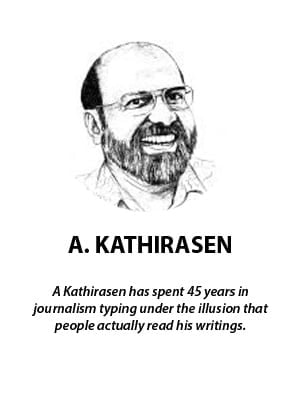 I have always been curious about Sabah voters’ high tolerance for politicians who jump from one party to another, especially after winning in an election and just before the government is formed. How is it that they vote again for many of these party hoppers?
I have always been curious about Sabah voters’ high tolerance for politicians who jump from one party to another, especially after winning in an election and just before the government is formed. How is it that they vote again for many of these party hoppers?
I decided to find out from ordinary folk when I was in Sabah recently. I spoke to random people whenever I had the opportunity and therefore what I’m writing here should not be treated as a data-based analysis.
One thing was clear. Everyone I spoke to was unhappy or frustrated with politicians who switched parties after winning an election. A few of them mentioned some names, with one of them describing these politicians as serial jumpers.
Some of them referred to such politicians as frogs, not as politicians, and laughed loudly.
They all seemed ashamed that Sabah probably had the most number of political frogs, with a few comparing their politicians with those from Sarawak.
They appeared to look up to Sarawak as the big brother who could stand up to the “Malaya bully”.
I got the impression that they were prouder of Sarawak politicians than they were of their own. One of them said: “If only our politicians had integrity like those in Sarawak.”
Another said: “Many of our politicians are not ashamed of switching parties and cheating voters. They lack integrity, which Sarawak politicians have. Look at Sarawak, their politics is so stable.”
So why do Sabah voters re-elect those who hop from party to party?
Many of the random group of people I spoke to struggled to give an answer. They paused to think before attempting to offer a reason, and even than there was no clarity.
I wondered if it was because they had not given this deep thought or that no one had previously asked them this question or that they were uneasy answering it.
One thing was clear though: they had resigned themselves to the situation.
One person said it had become “normal” and that voters had accepted it. Another felt it was a case of “better the devil you know than the devil you don’t”, adding that it did not make much difference to the lives of ordinary people like her.
Yet another said he had no problem because he liked his elected representative, who had jumped party. He suggested the tolerance level was high because these politicians were very likeable and their party affiliation did not matter to most voters.
One person said most of the politicians were in politics to “cari makan” (earn a living) and it was the only thing they knew how to do.
“That is why they jump parties to join the winning party. If you are in the party that runs the government, you are fortunate. It’s just a matter of time before you become rich, if not very rich.”
He cited his cousin as an example. The man was originally an Umno member but switched to Bersatu in 2018 after Pakatan Harapan – of which Bersatu was a partner – formed the federal government and also became the majority partner in the Sabah government.
Then, after the 2022 general election, he quit Bersatu and joined Gabungan Rakyat Sabah or GRS.
Before his cousin joined Umno, he had no cars but today he owns seven cars. And, he told me, the cousin was not even an elected representative.
“That is how he is. And that is how many politicians here are. They want to join the winning team. I don’t find it wrong for them to do so. That’s their livelihood.”
Many of them said the politicians were very friendly and that people could meet them without bureaucratic hassle or having to wait for appointments or going through several assistants.
I heard the same thing from a senior executive from Kuala Lumpur currently working in Sabah. He said: “In KL, if you want to meet a minister, it’s not easy. Here there is no problem at all. Ministers, not to mention elected representatives, are available to talk to you without any hassle.”
Several locals I spoke to said they were only interested in ensuring enough food and basic comforts for their families and to be left alone to live their lives.
One man who has worked in Kuala Lumpur explained: “We suspect that some of them and their cronies make money in various ways but they don’t disturb us. They don’t try to divide us, as politicians in Malaya do. They don’t insist that we should only work with this tribe or this group or people of this or that religion. They don’t come up with policies that hinder our search for a livelihood. We can continue working and earning a living. But if we do need anything, we can approach them.”
As I mingled with Sabahans, I realised that it is not in their nature to be confrontational or harsh. Perhaps that explains their high tolerance for party hoppers.
One thing was clear to me: Sabahans are friendly and trusting, and they are wonderfully pleasant to be with. - FMT
The views expressed are those of the writer and do not necessarily reflect those of MMKtT.



No comments:
Post a Comment
Note: Only a member of this blog may post a comment.